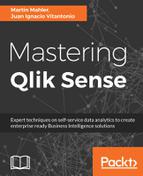Coding in Qlik Sense requires a good understanding of web development and a knowledge of the relevant libraries. Especially for users who do not have a software development background, this chapter provides them with a crash course of what is relevant in Qlik Sense and why. The same applies to QlikView developers and consultants who might have a technical background in Qlik but are embarking on the web development journey for the very first time. This chapter, while extensive, provided you with a good understanding of the triangle of web development, which consists of CSS, JavaScript, and HTML. While it won't make you an expert straight away, you will generally be able to understand the lingo and the relationship between these three core languages.
As with many other programming languages, JavaScript, and web development benefit greatly from freely available open source libraries. Getting a little more technical, you were introduced to the most relevant JS-based libraries used in Qlik Sense and the chapter also explained how they work and why they are essential to Qlik Sense and to extended development on top of the Qlik API. You should be able to talk about AngularJS, D3, and RequireJS and, if required, know where to get additional training or knowledge.
To summarize the overview, this chapter showed you how debugging works when doing web development. It's an integral skill set to know how to quickly find your errors and fix them, as well as navigate through the produced code. Especially in Qlik, there will be a lot of dependencies on existing modules and codes, so being able to easily demystify the whole web app using Chrome's DevTools will take your fears away from web development and make it more fun and less frustrating to work with.
It's important to note, however, that this overview will not be able to turn you into an expert. It is high level and it's strongly advised to conduct additional reading or tutorials on JavaScript or the libraries to become more proficient at Qlik Sense. As much as reading helps, learning to code is best done when developing your own projects: play around, contribute to open source projects, and don't be afraid to delve into JavaScript-it will be very rewarding in the long term.
Equipped with an overview of how to code in Qlik Sense, the next chapters will introduce you to basic development of Qlik extensions and mashups where all of these concepts and libraries are used.
